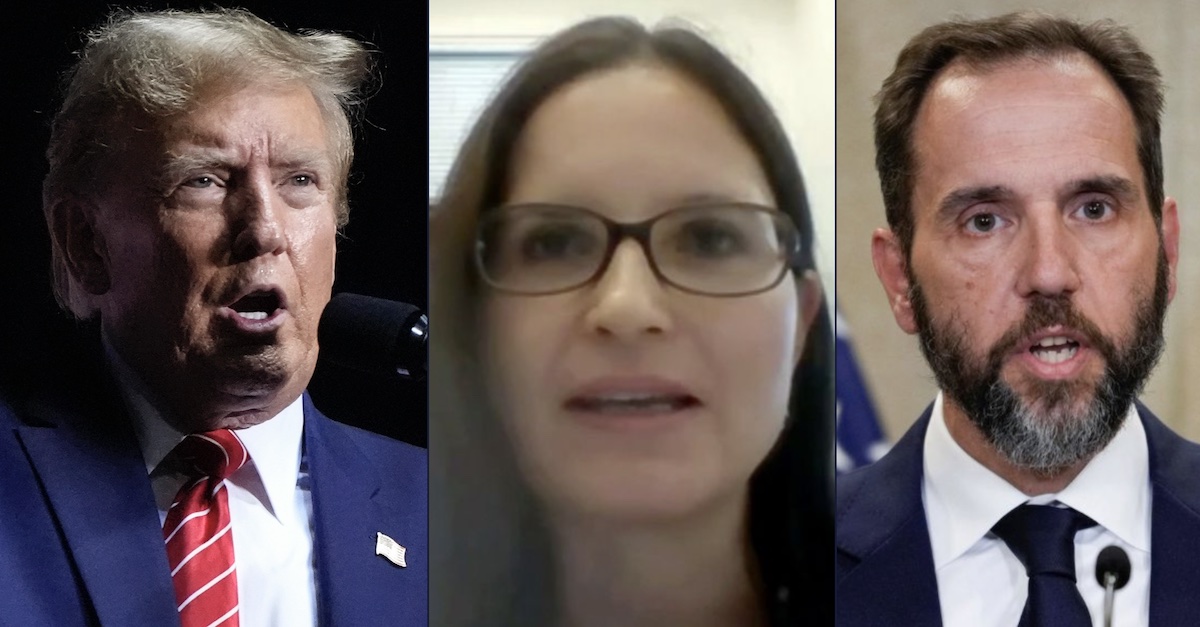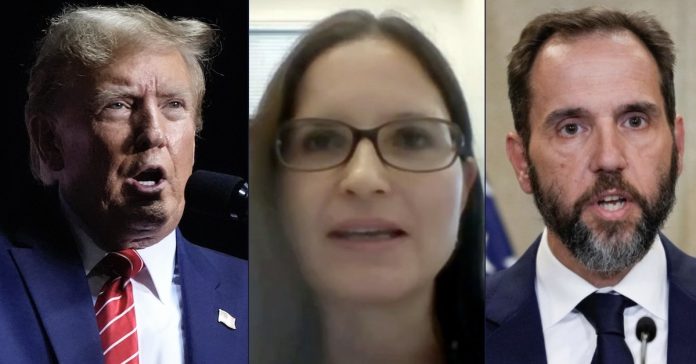
Donald Trump (AP Photo/Mike Stewart), File), U.S. District Judge Aileen Cannon, special counsel Jack Smith (AP Photo/J. Scott Applewhite, File)
The Thursday motion hearing in the Mar-a-Lago case on former President Donald Trump’s bid to dismiss his Espionage Act indictment offered a hint or two as to the judge’s leanings, but court watchers were clear on their view, whether in advance of or during the proceeding, that the defense’s “exotic” and “long shot” contentions should be rejected.
All eyes were on U.S. District Judge Aileen Cannon as she heard first from Trump attorney Emil Bove that the indictment should be dismissed on grounds of “unconstitutional vagueness” as applied to the defendant.
According to Politico, Cannon grilled the Special Counsel’s Office for examples of other high-level ex-executive branch officials facing prosecution under the Espionage Act while also focusing on the timing of the alleged crimes.
“If that’s the theory of the indictment,” that Trump began violating the Espionage Act as soon as he was out of office, “then there would be other officials who clearly would have run afoul of this provision as charged,” Cannon reportedly said to Bove.
As Law&Crime reported at length prior to the hearing, the “unconstitutional vagueness” argument attacked the indictment as a whole but also specifically as to count 19, which the Trump legal team, including Bove, Chris Kise and Todd Blanche, challenged by pointing to Trump’s “Q clearance.”
Count 19, a willful retention of national defense information charge relating to an “Undated document concerning nuclear weaponry of the United States,” should not have been brought because Department of Energy records “indicat[ed] that President Trump maintained the ‘Q’ clearance that is relevant to the document charged,” the defense has said. The lawyers asserted that documents the Special Counsel’s Office produced ended up backing their “Q clearance” conclusion.
Jack Smith responded that Trump’s “Q clearance” can only have vanished “as a matter of law” the moment Joe Biden was inaugurated as president.
Bottom line: Trump argues that 18 USC § 793(e) is unconstitutionally vague as applied to him so Counts 1-32 must be dismissed. Also, he claims that Count 19 must be dismissed because he maintained the appropriate security clearance at the time in question for that document.
— Katie Phang (@KatiePhang) March 14, 2024
Aside from the challenge of count 19 specifically, Trump lawyers have generally claimed that the “unconstitutionally vague” charges seek to criminalize “a former President operating within the framework of the Presidential Records Act (‘PRA’), who (1) acted as the ultimate Original Classification Authority based on Article II of the Constitution and under Executive Order 13526, (2) has recourse to the executive privilege, and (3) is entitled to immunity for his official acts.”
In court on Thursday, Jay Bratt of the Special Counsel’s Office (SCO) reportedly said there’s “been nothing remotely like this” case. He also drew a distinction between having the clearance to view documents and permission to take them wherever one pleases, like, say, one’s “basement.”
“Certainly, certainly,” the judge reportedly responded to that point.
Importantly, it seems Cannon was not immediately persuaded by the “unconstitutional vagueness” arguments about the Espionage Act.
“It’s hard to say that that provision itself is unconstitutionally vague,” she said, Politico reported.
As to the Presidential Records Act, the defense has argued Trump had “virtually unreviewable Article II executive authority to designate” the classified documents at issue “as personal when, as alleged in the Superseding Indictment, he ’caused’ the materials to be transported out of the White House while he was still in office,” making those “official acts” he is immune from facing prosecution for.
The special counsel previously answered those sweeping arguments to dismiss by writing that the Presidential Records Act did in no way “exempt” Trump from prosecution nor “entitle” him to decide on his own that classified documents were his.`
“The PRA does not exempt Trump from the criminal law, entitle him to unilaterally declare highly classified presidential records to be personal records, or shield him from criminal investigations — let alone allow him to obstruct a federal investigation with impunity,” Smith said.
In court, Bratt reportedly said Trump could not merely transform the nation’s secrets into personal records by “fiat.”
“It would do violence to the text [of the PRA] to say a president can simply, by fiat, make what the law requires to be a presidential record a personal record,” Bratt said, Politico reported.
Tellingly, when defense attorney Todd Blanche reportedly said that presidents since George Washington have at their “own discretion” taken “materials out of the White House,” the judge seemed more than skeptical.
In the classified docs hearing, Trump attorney Todd Blanche argues “presidents since George Washington have taken materials out of the White House” at “their own discretion.”
But Judge Cannon seems skeptical of the defense’s PRA argument: “It’s difficult to see how this gets you to…
— Kyle Griffin (@kylegriffin1) March 14, 2024
“It’s difficult to see how this gets you to the dismissal of an indictment,” Cannon reportedly said.
The SCO’s David Harbach was clear in his view that the defense fell far short.
“The documents charged in the indictment are not personal records. Period. They are nowhere close to that,” he reportedly said.
Late Wednesday, the special counsel separately responded to claims Stephen Miller’s legal group made about the National Archives — namely, that NARA’s criminal referral violated the Administrative Procedure Act and jeopardized the whole case.
If America First Legal’s argument were to be accepted, Smith said, then that would mean NARA would not be able to report a possible shooting threat to the FBI until it engages in “notice-and-comment rulemaking to promulgate a regulation authorizing it to make such a referral.”
“The Court should reject this unsupported and untenable theory,” he urged.
What do other lawyers think of the case being made by the defense and its allies? Former federal prosecutor Renato Mariotti, for one, said the motions “are a long shot at best,” but he noted that Judge Cannon’s past receptiveness to “other bizarre arguments from Trump’s team in the past” made predicting how she might rule difficult.
Trump’s motions today are a long shot at best.
But given that Judge Cannon has been very receptive to other bizarre arguments from Trump’s team in the past, I wouldn’t be surprised by anything she does. https://t.co/M6w8qnXrJF
— Renato Mariotti (@renato_mariotti) March 14, 2024
Cannon, a Trump appointee, memorably and “improperly” issued a ruling early on in the Mar-a-Lago case blocking prosecutors from investigating the former president. This led to a correction from the U.S. Court of Appeals for the 11th Circuit on a question of law that had a “clear” answer, but Cannon went on to preside over the Mar-a-Lago prosecution anyway.
Since that time, Cannon has needled the prosecution on issues small and (by comparison) big, slowed deadlines, granted extensions to the defense, and pushed back the trial date, prompted the special counsel to on at least two occasions accuse her of making a “clear error” (and on at least one occasion threaten an appeal), and finally, given the possibility that government witness names might come out as a result of the “clear error,” the judge inspired Trump Employee 5 to reveal his identity on national television.
The prosecution has insisted that naming witnesses will only open them up to threats to their safety, no matter how small or even clerical their role is in Trump’s legal peril. But that’s an issue for another day in Cannon’s Florida courtroom.
As to the issues of the day, Harry Litman severely criticized the defense for offering up “exotic (at best)” arguments that “are frivolous to absurd” and should be doomed to fail as a matter of law.
“There is an Alice in Wonderland quality to the Cannon hearing w/ Trump as Humpty Dumpty saying words — eg unauthorized possession or national defense info–mean (or don’t mean) whatever I say, and Cannon the Red King dispensing capricious justice,” the Los Angeles Times legal columnist and former federal prosecutor remarked. “The unifying point is that Trump is advancing exotic (at best) arguments that a) are frivolous to absurd but b) are basically factual contentions he can try to trot out at trial, not bases for dismissing the case.”
MSNBC legal analyst and former federal prosecutor Joyce Vance said much the same, also framing Cannon’s eventual ruling as anyone’s guess.
“I’ve handled a lot of motions in criminal cases. These are barely better than frivolous,” she said, before adding later: “If this was any other judge, I’d be telling you there was a 105% chance these motions would be dismissed. But with Judge Cannon, we just have to wait and see how she’ll rule.”
Norm Eisen, the lawyer and former the Obama administration’s “Ethics Czar,” similarly called the Trump motions “borderline frivolous” and opined that there was no need for the full day that Cannon set side for argument.
Trump’s MAL motions being heard today are borderline frivolous
Judge Cannon setting aside an entire day for these flimsy claims is still more evidence of her partisan lean
I discussed @cnni @FWhitfield pic.twitter.com/KlPdy1HTll
— Norm Eisen (norm.eisen on Threads) (@NormEisen) March 14, 2024
Of note, Judge Cannon on Thursday reportedly avoided addressing when the Mar-a-Lago trial would begin.
After a break in the proceedings, the hearing continued on into the afternoon but ended before 3 p.m., despite a “full day” being reserved for argument. While she did not decide from the bench on the motions, Cannon reportedly did say that she’ll be “promptly” issuing a ruling.
NOTE: Judge Cannon did announce from the bench at the close of the hearing that she would be “ruling [on these motions] promptly.” https://t.co/aENNRTBA5R
— Katie Phang (@KatiePhang) March 14, 2024
Have a tip we should know? [email protected]

